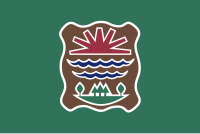St. Francis Indians

Flag of St. Francis/Sokoki Band of Abenaki
|
|
| Total population | |
|---|---|
| 12,000 (US and Canada) | |
| Regions with significant populations | |
|
United States (Maine, New Hampshire, Vermont) Canada (New Brunswick, Quebec) |
|
| Languages | |
| English, French, Abenaki | |
| Religion | |
| Now largely Roman Catholic Originally Abenaki religion |
|
| Related ethnic groups | |
| Algonquian peoples |
The Abenaki (Abnaki, Abinaki, Alnôbak) are a Native American tribe and First Nation. They are one of the Algonquian-speaking peoples of northeastern North America. The Abenaki live in Quebec and the Maritimes of Canada and in the New England region of the United States, a region called Wabanahkik ("Dawn Land") in the Eastern Algonquian languages. The Abenaki are one of the five members of the Wabanaki Confederacy.
"Abenaki" is a linguistic and geographic grouping; historically there was not a strong central authority. As listed below, there were numerous smaller bands and tribes who shared many cultural traits. They came together as a post-contact community after their original tribes were decimated by colonization, disease, and warfare.
The word Abenaki, and its syncope, Abnaki, are both derived from Wabanaki, or Wôbanakiak, meaning "People of the Dawn Land" in the Abenaki language. While the two terms are often confused, the Abenaki are one of several tribes in the Wabanaki Confederacy.
Wôbanakiak is derived from wôban ("dawn" or "east") and aki ("land") (compare Proto-Algonquian *wa·pan and *axkyi) — the aboriginal name of the area broadly corresponding to New England and the Maritimes. It is sometimes used to refer to all the Algonquian-speaking peoples of the area—Western Abenaki, Eastern Abenaki, Wolastoqiyik-Passamaquoddy, and Mi'kmaq—as a single group.
...
Wikipedia
